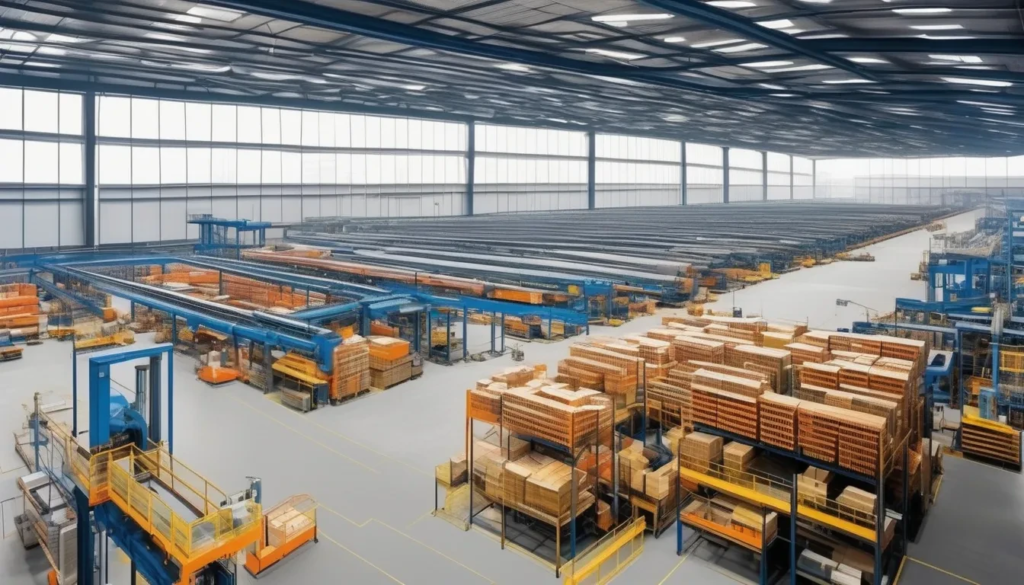A Private Warehouse Management System (WMS) is an IT solution designed to help businesses fully optimize their warehouse processes in-house. This includes activities such as receiving, storing, order picking, packaging, and shipping goods. Unlike shared warehouses, such as those managed by logistics providers, a private WMS focuses solely on the needs of a specific organization. The system can be fully tailored to the company’s processes and strategic objectives, which is crucial for industries where customization and control are essential.
A private WMS is ideal for organizations that want to improve their warehouse operations without relying on third parties. This makes it a powerful tool for businesses looking to guarantee flexibility, speed, and accuracy within their supply chain.
In which industries is Private Warehousing used?
Private Warehousing is most common in sectors where logistics and inventory management directly impact operational efficiency, compliance, and customer satisfaction. Below are some key industries where private WMS solutions play a pivotal role:
- Chemical Industry
In the chemical sector, safety, traceability, and regulatory compliance (such as REACH and ADR) are critical. Products range from hazardous materials to basic chemicals, often requiring strict storage and transportation guidelines.
A WMS manages complex processes like tracking hazardous materials and registering safety protocols. It ensures accurate batch tracking, enabling quick identification of affected products in case of incidents. - Pharmaceutical Industry
Here, precision, quality control, and adherence to regulations like GMP (Good Manufacturing Practices) are paramount. Medicines and medical devices often require temperature-controlled storage and complete traceability.
A WMS automatically records production and storage data, ensuring smooth audits. Features such as temperature monitoring and real-time inventory updates are essential for quality assurance. - (Animal) Food and Beverages
Freshness and food safety are central here. From perishable products to bulk goods, logistics in this sector require flexibility and tight control.
With a WMS, businesses can ensure FIFO strategies and manage expiration dates. Traceability and batch management are crucial for executing recalls quickly and effectively. - Industrial Manufacturing and Assembly
For manufacturers, short lead times and seamless integration with production processes are essential.
A WMS supports just-in-time deliveries by ensuring raw materials are available when needed. Assembly businesses can perform complex picking processes and manage assembled products more efficiently. - Packaging and Distribution Companies (including e-commerce)
Businesses handling custom packaging and high volumes need a WMS to manage spikes in orders and inventory movement effectively.
Automation of order picking and inventory updates ensures error-free deliveries and higher customer satisfaction.
What software functionalities are essential for different industries?
The core of a private WMS lies in the functionalities it offers. Depending on the sector and specific business needs, these functionalities can vary significantly.
- Inventory Management
Real-time visibility into stock at location, batch, or serial number level.
Automatic alerts for low stock or approaching expiration dates. - Order Processing and Picking Strategies
Support for various picking methods, such as wave picking (for large orders) or zone picking (for more efficient warehouse space use).
Prioritization of urgent orders and dynamic rearrangement of warehouse locations. - Tracking and Traceability
Full tracking of goods from receipt to delivery.
Capabilities for generating certificates or labels, for instance, in the food industry. - Integration with Hardware and Automation
Support for barcode scanners, RFID technology, AGVs (Automated Guided Vehicles), and automated storage and retrieval systems.
Connections to advanced transport and sorting systems for distribution centers. - Reporting and Business Intelligence
Dashboards with KPIs like order throughput, storage capacity, and error rates.
Historical data analysis for predictions and continuous process improvement.
Integration with MES and MOMS in manufacturing environments
A private WMS achieves its full potential when integrated with a Manufacturing Execution System (MES) and a Manufacturing Operations Management System (MOMS).
- Synchronizing Production and Logistics: The WMS and MES share data on raw material levels and production schedules, preventing downtime and ensuring efficient processing and storage.
- Traceability and Compliance: Integration enables businesses to track every step of the production process, from raw materials to finished products. This is vital for audit trails and quality assurance.
- Efficient Planning: MOMS systems use WMS data to optimize resource planning, reducing waste.
What are the benefits of a private WMS?
- Cost Savings: Automation minimizes human errors and optimizes warehouse space.
- Faster Lead Times: Optimizing order picking and inventory management reduces delivery times, boosting customer satisfaction.
- Ensuring Compliance: Automatic batch registration and traceability help businesses meet all relevant laws and regulations.
- Improved Data-Driven Decision-Making: By collecting and analyzing data, companies can identify trends and respond more effectively to future challenges.
Can a producer or goods owner manage without one?
Not really. Without a WMS, businesses risk:
- Order Processing Errors: Manual processes often lead to incorrect or delayed deliveries.
- Inefficiency and Higher Costs: Overstocking, shortages, and suboptimal warehouse layouts lead to waste.
- Loss of Customer Trust: Customers expect fast and accurate deliveries.
In an increasingly complex supply chain, a private WMS is essential to stay competitive.
Why choose DH Automation from Werkendam?
- Specialists in Custom Solutions: At DH Automation, you don’t get a 100% off-the-shelf solution, but a mature, relevant, industry-specific system that’s tailored to fit your business processes perfectly.
- Deep Industry Knowledge: With many relevant clients (see the website), we have proven solutions for complex logistical challenges.
- Customer-Centric Focus: Our approach is pragmatic and results-oriented. We offer customized support, both during implementation and ongoing use.
- Reliability and Flexibility: With experienced professionals and short communication lines due to our regional focus (Netherlands and Belgium), you can rely on quick, high-quality service.
Choosing DH Automation means choosing a partner who values your success as much as you do.
Author is Harry Luijk – Manufacturing, Logistics & Supply Chain Professional – CCO at DH Automation Technology BV – Partner at Merlyn Consult.





